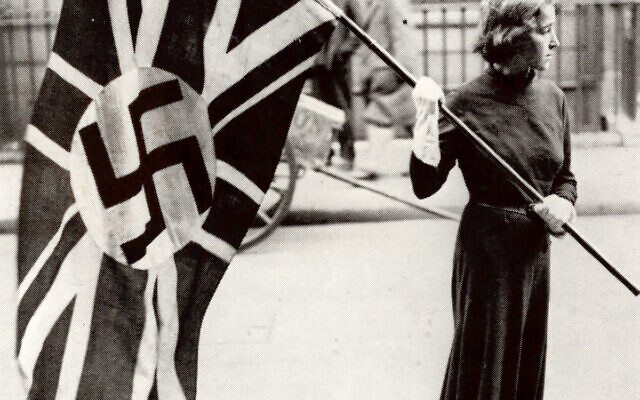OPINION: Fascism’s past and antisemitism’s present
Jewish News' historian on the dangers of giving poisonous opinions the oxygen of credibility and publicity
There have been antisemites since at least the pharaohs so it’s no surprise that they still exist. The problem for any tiny minority though, like the antisemites, is to get their message over to the public. The creation of the radio (TMT 1922) provided a new method.
The general manager of the BBC, appointed in 1923, was the son of a Scottish Presbyterian minister, a 6ft 6 engineer called John Reith. In 1927 he was appointed director-general.
The 1930s saw the growth of the British Union of Fascists and their meetings were noted for violence under their leader, Oswald Mosley. The Prime Minister at the time was Stanley Baldwin and he sent one of his MPs to a Fascist meeting to see how it was run. The MP reported back that there was unacceptable treatment of hecklers and the message from the platform was totally foreign to British values.
Baldwin was a very able politician but he realised that banning the Fascists was not an option. Free speech was a a fundamental right then as it is today. So he went to see Reith and they agreed that Mosley would never be allowed on the radio again. Deprived of such a source of publicity, membership of the Fascists declined markedly.
Reith died in 1971 and mores the pity. The reputation he built for the BBC makes it an organ people living in dictatorships around the world rely on for the truth. Today, in its reporting of the conflict in Gaza, the BBC is accused of bias and some executives in the Corporation have been fired for antisemitism.
The ability to use social media and other modern technologies to spread the poison is an additional problem for all the political parties trying to create a lasting multi-cultural nation. There is no possibility of the anti-semites winning over the population, but the BBC can present a biased picture of what is happening in Gaza.
BBC News does now automatically refer to the massacre of over 1,000 Israelis on October 7. That started the war. What it doesn’t equally automatically refer to is the fate of the hostages held by Hamas. Equally, the alleged death toll in Gaza is reported by Hamas and could well be exaggerated, but the possibility of exaggeration is never mentioned.
Perhaps the worst example of bias is the reporting of Hamas accusations which are not questioned. The involvement of some UNRWA staff in the massacres of October 7 has led to the withdrawal of support for the organisation by a number of countries, but Hamas spokesmen condemning this is not followed by the BBC interviewer asking if their involvement in October 7 is true. Equally, the stated Hamas objective of killing all Jews is not queried as justifiable.
The BBC reporting thousands demonstrating for a ceasefire is not matched by the BBC pointing out that a ceasefire would make it much easier to set up another October 7, as is the stated intention of the Hamas leadership.
If it wasn’t for the fact of 1,200 dying on 7 October, it would be reasonable to suggest that the stated aim of Hamas was just hot air by a small number of extremists, but 7 October happened.
We lost six million in the Holocaust; we’ve now lost another 1,200. Let those who mark “like” by antisemitic distortions realise that people will actually die if antisemitism gains popular support.

Thank you for helping to make Jewish News the leading source of news and opinion for the UK Jewish community. Today we're asking for your invaluable help to continue putting our community first in everything we do.
For as little as £5 a month you can help sustain the vital work we do in celebrating and standing up for Jewish life in Britain.
Jewish News holds our community together and keeps us connected. Like a synagogue, it’s where people turn to feel part of something bigger. It also proudly shows the rest of Britain the vibrancy and rich culture of modern Jewish life.
You can make a quick and easy one-off or monthly contribution of £5, £10, £20 or any other sum you’re comfortable with.
100% of your donation will help us continue celebrating our community, in all its dynamic diversity...
Engaging
Being a community platform means so much more than producing a newspaper and website. One of our proudest roles is media partnering with our invaluable charities to amplify the outstanding work they do to help us all.
Celebrating
There’s no shortage of oys in the world but Jewish News takes every opportunity to celebrate the joys too, through projects like Night of Heroes, 40 Under 40 and other compelling countdowns that make the community kvell with pride.
Pioneering
In the first collaboration between media outlets from different faiths, Jewish News worked with British Muslim TV and Church Times to produce a list of young activists leading the way on interfaith understanding.
Campaigning
Royal Mail issued a stamp honouring Holocaust hero Sir Nicholas Winton after a Jewish News campaign attracted more than 100,000 backers. Jewish Newsalso produces special editions of the paper highlighting pressing issues including mental health and Holocaust remembrance.
Easy access
In an age when news is readily accessible, Jewish News provides high-quality content free online and offline, removing any financial barriers to connecting people.
Voice of our community to wider society
The Jewish News team regularly appears on TV, radio and on the pages of the national press to comment on stories about the Jewish community. Easy access to the paper on the streets of London also means Jewish News provides an invaluable window into the community for the country at large.
We hope you agree all this is worth preserving.






















